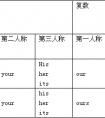单项选择。Here some pencils for every teacher now. [ ]A. wasB. wereC. isD. are -七年级英语
Have you ever seen such a naughty kid like him ! 你见过那个孩子像他这么调皮!
C. 在陈述句中
陈述句在一般情况下用自然语序;但由于英语语法的某些原因,陈述句也要使用倒装语序。这些原因大致可以归纳如下:
1) 为了避免句子部分内容不必要的重复,常用"so + be动词(助动词、情态动词)+主语"或"neither / nor + be动词(助动词、情态动词)+主语"的倒装句式。
其中第一个句式表示"与前面所述的肯定情况相同", 第二个句式表示"与前面所述的否定情况相同"。例如:
His brother is a college student; so is mine.
他弟弟是大学生,我弟弟也是。
His brother is not a college student; nor is min .
他弟弟不是大学生,我弟弟也不是。
He used to have his further study abroad; so did I.
他曾去国外深造过,我也去过。
He didn't use to have his further study abroad; neither did I.
他没去国外深造过,我也没有。
One of my friends can speak three foreign languages; so can his wife.
我的一个朋友会说三门外国语,他的妻子也会。
One of my friends cannot speak three foreign languages; neither can his wife .
我的一个朋友不会说三门外国语,他的妻子也不会。
They are now preparing for their final examinations; so are we .
他们正在为期末考试作准备,我们也一样。
They are not now preparing for their final examinations; nor are we .
他们没在为期末考试作准备,我们也没有。
2)具有否定意义的词或短语置于句首时(除否定词修饰主语外),句子一般要写成部分倒装句。
这类词或短语常见的有:
not, never, seldom, hardly, rarely, scarcely, by no means, under no circumstances, in no way, at no time, no sooner … (than), hardly … (when), not only … (but also), not until… ,等。例如:
Hardly had she sat down when she heard someone knocking at the door .
她还没来得及坐下来,就听见有人敲门。
Not until twelve o'clock did he go to bed last night .
他昨晚直到十二点钟才睡觉。
Never have my sisters been to Hong Kong before .
我的妹妹们以前从未去过香港。
No sooner had I returned home from New Zealand than I bought a house and went to live there.
我从新西兰一回国,就买了一栋房子并在那儿住下了。
So far as I know, seldom does Mary come back to see her mother.
就我所知,玛利几乎很难回来看她妈妈。
Scarcely a drop of rain fell here last fall . (否定词修饰主语时,句子不用倒装。)
去年秋天,这儿几乎没下一滴雨。
3)当so, often, only等表示程度、频率的副词放在句首时,句子一般要倒装。例如:Only in this way can you come up with a solution to the problem.
只有这样,你才有可能想出解决这个问题的办法。
So serious was the situation that everybody faced a test.
形势如此地严峻,每个人都面临着一场考验。
So hard did he overwork that he fell ill at last. 他太操劳过度以致最后病倒了。
4)当there, here, then, now等副词在句首,且谓语是come, go, be等动词时,句子一般要全部倒装。
其意义在于引起他人的注意。如果这类句子的主语是代词,则不用写成倒装句。例如:
Now, here goes the story.这个故事是这样的。
Look, there comes the taxi.瞧,出租车过来了。
Then came another question.然后又一个问题提出来了。
Then followed the four-year War of Liberation.接下来是四年的解放战争。
5) 当out, in, away, up, bang等表示方位或拟声词放在句首时,句子一般要全部倒装。
这类句子比自然语序的句子更为生动、形象。但如果这类句子的主语是代词,则不用写成倒装句。例如:
Bang goes my ace.我砰地一下打出了"爱司"。
Away flew the bird.那鸟飞走了。
Suddenly, in came a man with a mask on his face.突然进来一个蒙着面具的人。
6) 其他情况还有:省略了if的虚拟条件句、某些表示祝愿的句子、以及某些让步状语从句,等等也要用倒装句式。例如:
(省略了if的虚拟条件句)Had they not helped us, we could not have done it so successfully.
如果没有他们的帮助,我们不可能把那件事办的如此成功。
Should he come, say "Nobody in" to him.
万一他来了,对他说:"公司没人。"
(某些表示祝愿的句子)May our friendship last forever.
愿我们的友谊常存!
May your company become prosperous.
祝贵公司生意兴隆!
(某些让步状语从句)Try as I might, I couldn't lift the stone.无论我使多大的劲,我也无法搬起那块石头。
They said they would follow the Party's lead come what might.
他们说无论发生什么情况,他们都会跟党走的。
7) 由于修辞或是平衡句子的原因也可以用倒装句;也可以不用。这不是一条必须的规定。
Next to this one is another grand hotel which is beautifully decorated .
家饭店隔壁还有一家装修华丽的大饭店。
On either side of the great avenue stood many block buildings.
这条大街的两侧都耸立着许多综合楼。(这类句子也可以不用倒装句。)
"I'm leaving for Beijing tomorrow," said Tom to his mother (OR: Tom said to his mother) .
汤姆对他妈妈说:"我明天动身去北京。"
Many block buildings stood on either side of the great avenue.
许多综合楼耸立在这条大街的两侧。
Another grand hotel, which is beautifully decorated, is next to this one .
这家饭店隔壁还有一家大饭店,那家饭店装修十分华丽。
1.完全倒装(Full Inversion):又称"全部倒装",是指将句子中的谓语全部置于主语之前。此结构通常只用于一般现在时和一般过去时。
谓语+主语+……
①There be(的各种形式)+主语(+地点或时间状语)
例子:
There was a drop in the temperature.温度下降了
There are brids singing in the tree.鸟儿在树上唱歌。
②副词小品词+谓语动词+名词主语+……
③过去分词或现在分词+be的各种形式+主语+……
2.部分倒装(Partial Inversion)(又称半倒装句):
指将谓语的一部分如助动词或情态动词倒装至主语之前,而谓语动词无变化。
如果句中的谓语没有助动词或情态动词,则需添加助动词do,does或did,并将其置于主语之前。
英语句子的倒装一是由于语法结构的需要而进行的倒装,二是由于修辞的需要而进行的倒装。
前一种情况,倒装是必须的,否则就会出现语法错误;
后一种情况,倒装是选择性的,倒装与否只会产生表达效果上的差异。
通常是希望强调句中的某一部分
1. 当以there, here, out , in , up , down, away 等副词开头的句子,为了起到强调的作用,可构成倒装句,只把副词放在句首,主语和谓语位置调换,不加助动词。
Our teacher came in.
In came our teacher.
这种倒装要求:主语必须是名词。主语是人称代词时,主语和谓语语序不变。
Here it is.
Away he went.
这类倒装句式一般只用一般现在时和一般过去时。
Here comes the bus.
Out rushed the boys.
2. how, then, just, often 表示时间的副词放在句首,可构成倒装句,只把副词放在句首,主语和谓语位置调换,不加助动词。
Then came 8 years of the Anti Japanese War.
3. 表地点状语的介词短语放在句首,要用倒装句式,以示强调。
这种倒装句也是主谓直接调换位置,不加助动词did, does或do.
Under a big tree sat a fat man half asleep.
4. there放在句首时,要用倒装句式。
在“there + be”结构中的谓语动词有时不用be , 而用表示类似“存在”观念的其他不及物动词。如:
live, stand, come, lie, flow, enter, rise 和appear等。
There came shouts for help from the river.
There lies a large wheat field in front of the house.
Many years ago there lived an old man in the wooden house.
In front of the tower flews a stream.
5. so + 动词+主语
neither/ nor + 动词+主语
表示两人的同样一个情况时,只能表示一件事,即上、下句所使用的动词、时态要一致。
否则要用so it is with…
You can ride a bike. So can I .
He has been to Beijing. So have I .
The first one isn’t good, neither is the second.
His uncle is a worker and has been working in the factory for more than ten years. So it is with his aunt.
6. so+ 形容词/副词that 的结构状语从句可以用正常语序表示,也可以把so+形容词/副词放于句首构成倒装。
句型如下: so +形容词/副词+be/助动词/情态动词that +从句。
Light travels so fast that it is difficult for us to imagine its speed.
= So fast does light travel that it is difficult for us to imagine its speed.
So easy was the work that they finished it in a few days.
7. done做形容词在句中做表语时,常把表语放在句首,要用倒装句式。
Gone forever are the days when the Chinese people had to use foreign oil.
8. 否定副词not , never, seldom, nowhere, little , rarely 放于句首时要用倒装句式。
We seldom get up at four in the morning.
- 最新内容
- 相关内容
- 网友推荐
- 图文推荐
上一篇:单项选择。—Whatthe score yesterday? — It 80:82. [ ]A. was, was B. is, is C. are, are D. were, were -七年级英语
下一篇:单项选择。Everyone going to learn English? [ ]A. is B. are C. do D. does -七年级英语
零零教育社区:论坛热帖子
| [家长教育] 孩子为什么会和父母感情疏离? (2019-07-14) |
| [教师分享] 给远方姐姐的一封信 (2018-11-07) |
| [教师分享] 伸缩门 (2018-11-07) |
| [教师分享] 回家乡 (2018-11-07) |
| [教师分享] 是风味也是人间 (2018-11-07) |
| [教师分享] 一句格言的启示 (2018-11-07) |
| [教师分享] 无规矩不成方圆 (2018-11-07) |
| [教师分享] 第十届全国教育名家论坛有感(二) (2018-11-07) |
| [教师分享] 贪玩的小狗 (2018-11-07) |
| [教师分享] 未命名文章 (2018-11-07) |

![The jeans_____ fit for me, maybe, the pair of jeans _____fitter for me.[ ]A.are; are B.is; is C.is ;areD.are; is-八年级英语](http://www.00-edu.com/d/file/ks/4/2/xidongci/2020-01-05/small4952a8c67458a8ae95f5f8e3ea8b4bf91578154110.png)
![Here _____some flowers.[ ]A.isB.areC.amD./-七年级英语](http://www.00-edu.com/d/file/ks/4/2/xidongci/2020-01-04/smallef3acfcb329d087ede3710c354ecc9151578152853.png)
![The price of the socks_____ 10 yuan. [ ]A. are B. is C. does D. can -七年级英语](http://www.00-edu.com/d/file/ks/4/2/xidongci/2020-01-04/small6e5d2db89e73d5a89d7deae9143a225a1578153319.png)


